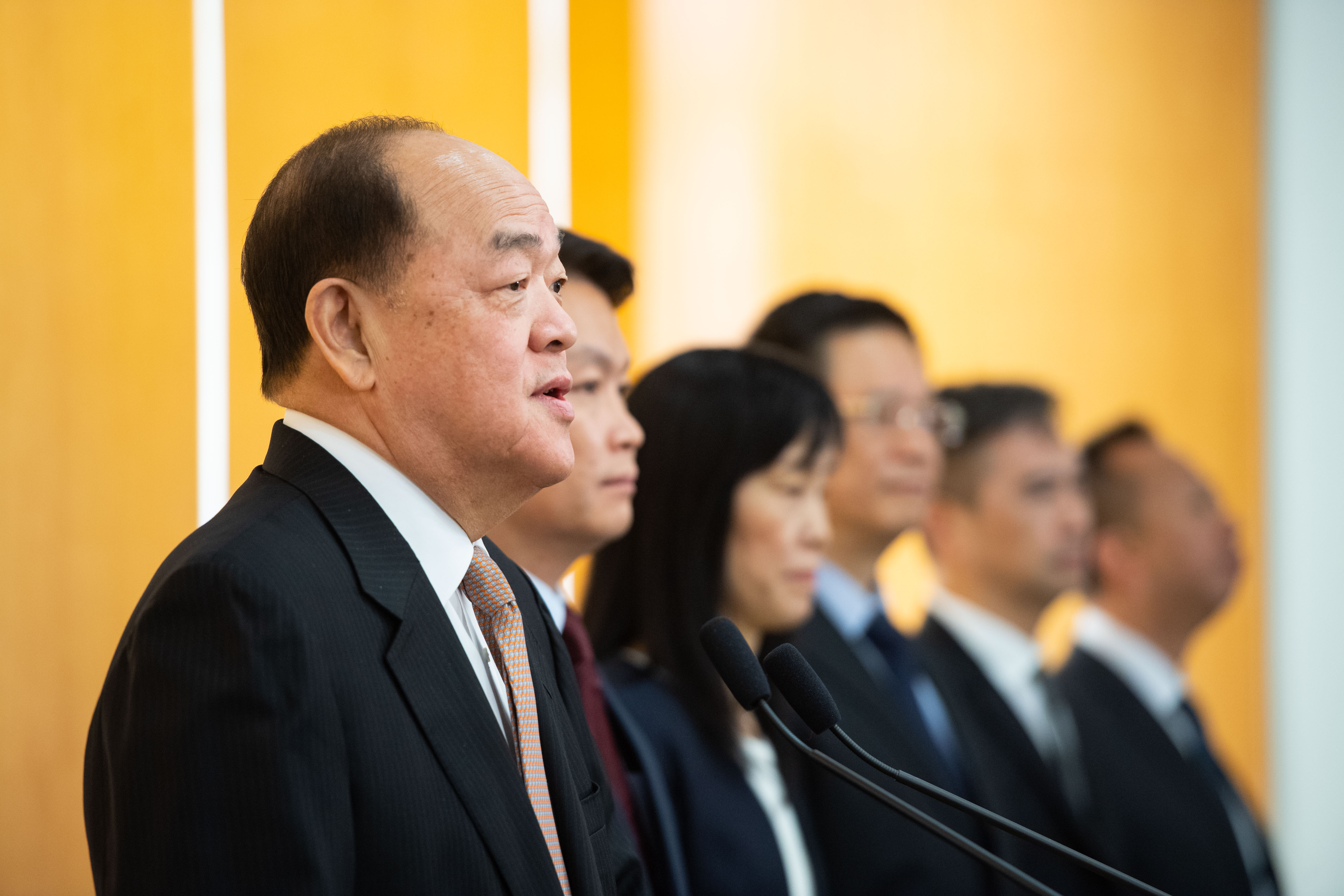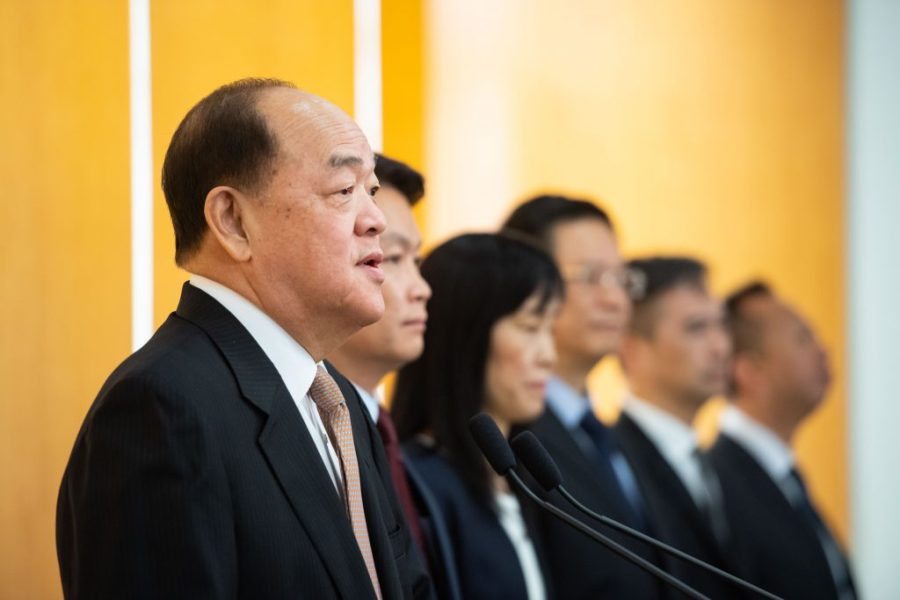Chief Executive-designate Ho Iat Seng reaffirmed on Monday that his government will put special emphasis on undertaking an in-depth reform of the public administration system.
Ho also said that he chose the officials for his new team after “repeated” consideration and discussions with potential candidates.
The State Council appointed on Sunday the nine principal officials and the chief prosecutor of the incoming government of the Macau Special Administrative Region (MSAR) which will take office on December 20 – the 20th anniversary of Macau’s return to the motherland. Only four of the 10 officer-bearers were reappointed, among them two policy secretaries.

Ho formally presented the 10 officials during a press conference at Government Headquarters yesterday morning, following their official appointments by the central government on Sunday.
Gratitude
Ho expressed his gratitude to the central government for its confidence and support, as it fully accepted his nominations for the principal officials of his incoming government and the public prosecutor-general (the official title of Macau’s chief public prosecutor).
Only four of the 10 officials were reappointed: Secretary for Security Wong Sio Chak, Secretary for Transport and Public Works Raimundo do Rosário, Commissioner of Audit Ho Veng On, and Public Prosecutor-General Ip Son Sang.
During Monday’s press conference, Ho delivered a speech before answering questions from the media, after which the 10 officials individually responded to reporters’ questions
In his speech, Ho said that the nomination process for the 10 officials had been “smooth” and that the central government accepted his nominations for all 10 positions.
Ho pledged that his government will continue to fully and accurately implement the “One Country, Two Systems” principle, strictly adhere to the nation’s Constitution and the Macau Basic Law, firmly uphold the country’s sovereignty, security and development interests, and firmly uphold the central government’s “overall jurisdiction” over the city.
Ho also said that the new government will continue to ensure the successful implementation of the principles of “One Country, Two Systems” with Macau characteristics, “Macau people governing Macau”, and a high degree of autonomy.
Ho also said that with the central government’s strong support and under the leadership of Macau’s first two chief executives – Edmund Ho Hau Wah and Fernando Chui Sai On, Macau’s civil society has remained united and the city’s economy has been thriving over the past two decades since the establishment of the Macau Special Administrative Region (MSAR) in December 1999.
Ho also pledged that his government will place strong emphasis on collecting opinions and suggestions from residents for its governance and that it will formulate measures and policies after fully considering civil society’s views.
Anti-graft & audit achievements
In the final part of his speech, Ho acknowledged the achievements made by the Commission Against Corruption (CCAC) and the Commission of Audit (CA) over the past two decades. Ho said that his government would firmly support the anti-graft body in its work, and also fully support the audit commission in its tasks, namely by placing special emphasis on carrying out follow-up work after the respective audit reports have been published.
In the fifth-term MSAR government, Commissioner Against Corruption (CCAC) André Cheong Weng Chon, 53, will replace Sónia Chan Hoi San as secretary for administration and justice. Municipal Affairs Bureau (IAM) Vice President Lei Wai Nong, 50, will replace Lionel Leong Vai Tac as secretary for economy and finance. Wong Sio Chak, 51, was reappointed as secretary for security in Ho Iat Seng’s government. Identification Services Bureau (DSI) Director Elsie Ao Ieong U, 51, will replace Alexis Tam Chon Weng as secretary for social affairs and culture. Raimundo do Rosário, 63, was reappointed as secretary for transport and public works in the new government.
Assistant Prosecutor-General of the Public Prosecution Office (MP) Chan Tsz King, 49, will replace André Cheong as the commissioner against corruption. Ho Veng On, 57, was reappointed as the commissioner of audit. Public Security Police (PSP) Commissioner Leong Man Cheong, 55, will replace Ma Io Kun as commissioner-general of the Unitary Police Service (SPU). Macau Customs Service Deputy Director Vong Man Chong, 53, will replace Alex Vong Iao Lek as director-general of the Macau Customs Service.
Ip Son Sang, 55, was reappointed at the helm of the Public Prosecution Office (MP) in the new government.
3 main criteria
During the Q&A period, Ho reiterated that he had had three main criteria, namely integrity, executive capabilities, and the willingness to communicate with residents, plus loving the country and Macau, when choosing the officials of his new team.
When asked what qualities the secretary for economy and finance-designate and the secretary for social affairs and culture-designate have that made him to choose them for the two positions, Ho said that one consideration when choosing officials for his new team was to enable well-performing public servants to move up in their careers.
Ho said that he had decided to choose Lei and Ao Ieong as the new secretary for economy and finance and the new secretary for social affairs and culture respectively after taking various factors into consideration. Ho said that he had intensively been comparing Lei and Ao Ieong with other potential candidates before finally choosing them.
Ho admitted that Lei and Ao Ieong had not been highly exposed to civil society and the media so that residents only had limited knowledge of them. Ho was quick to add that many public servants in Macau have always been working hard to serve the citizenry.
‘Good performance’
Ho praised Ao Ieong for her “very” good performance in developing the Identification Services Bureau into a “service-orientated” public entity. Ho said that entities under the social affairs and culture portfolio require strong service orientation, such as health service, social security, culture, education, and sports. Ho said that Ao Ieong would be capable of a good performance in her new position.
Ho noted that Lei has been working in the municipal field for a long time which has enabled him to gain a good understanding about the needs of local small- and medium-sized enterprises (SMEs).
Ho said that apart from Macau’s economic diversification, SMEs, which account for the majority of businesses in the city, would also need more support. Ho said he believed that Lei’s work experience in the public administration would allow him to provide local SMEs with stronger and more suitable support.
‘Very clean’ Rosário
When asked about Rosário’s reappointment bearing in mind that he had repeatedly said in the past that he would like to retire, Ho praised Rosário for being a “very clean” official.
Ho said that Rosário had tackled many issues left by his two predecessors during the past five years. Ho admitted that the transport and public works portfolio always involves “sensitive” matters, adding that if officials of the portfolio are not clean enough, this would cause many doubts and “unnecessary” speculation among residents, which would then adversely affect the public administration’s governance.
According to the Macau Post Daily, Ho said that he had tried hard before finally succeeding in persuading Rosário to continue to stay his current position. Ho said that he and Rosário agree that the new government will strive for good achievements in areas such as public housing, the Light Rail Transit (LRT) project and the fourth Macau-Taipa link project.
‘Proper’ arrangement for non-reappointed officials
When asked about the six officials who were not reappointed, Ho said that top officials should be aware of the fact that their positions always have a term limit, unlike public servants who normally continue to work until retirement, adding that therefore they should set clear goals for themselves to complete their five-year terms. Ho emphasised that top officials are not necessarily reappointed. Ho said that his government would make a “proper” arrangement for the six officials, allowing them to make good use of their abilities to continue to serve the country and the city.






